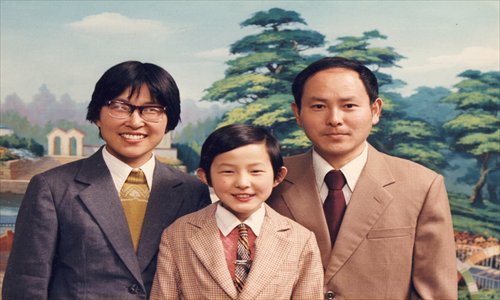Separate lives
A recently aired documentary in Shanghai has proved a huge hit after detailing the plight of a Chinese man who lived and worked in Japan alone for 15 years in order to support his wife and daughter back home.
Ding Shangbiao was 35 years old in 1989 when he applied to study at a language school in Hokkaido. However, opportunities of work that the school promised never materialized, and finding himself 420,000 yen ($5,282) in debt, he left the course and traveled to Tokyo where he started to work as an illegal immigrant. After he left China, he didn't see his young daughter until she traveled to Japan eight years later; he didn't see his wife for 13 years in total.

Family fate
"I wanted to be able to work so that I could change the fate of my family," he said in the documentary which is called Living in Tears and is directed by Zhang Liling.
In the film, which was shot over 10 years, Ding is seen expressing his dream of being able to afford the best possible education for his daughter. For most of his time in Japan, Ding worked two to three jobs every day and often didn't get off work until midnight.
Today Zhang is the chairman of the board of CCTV Daifu TV in Japan, and rose to fame because of her Days in Japan documentary series which narrated the life of Chinese people working and studying in Japan. Living in Tears is the last episode in the series, and it received an audience rating as high as 20 percent on the Fuji Television Network channel in Japan in 2006. When it was screened in Japanese cinemas in 2009, it topped the country's box office.
And on August 13 and 14 Living in Tears was screened on the Documentary Channel of Shanghai Media Group (SMG), the first time it has been shown on the Chinese mainland.

According to Deng Jie, executive producer of the The 25th Hour program on which the episode was shown, the reason for introducing the show in the city is precisely because the family is from Shanghai.
Zhang got approval from Ding to have the documentary shown first in his hometown. Ding and his family now live in the US, where his daughter became a doctor after graduating from the State University of New York.
"Showing the program in August coincides with the vacation time when many overseas students come back to China. We imagine that these viewers would empathize with people like Ding living and striving abroad," said Deng.
Although Living in Tears was only shown in China for the first time this August, the rest of the series was finished and screened in China about 10 years ago. Coincidentally Zhang also went to Japan in 1989 in order to study, as did Ding. And when Zhang first started filming Days in Japan in 1995, she knew a number of Chinese overseas students. "Our intention was to make series about the first group of people who went abroad after China's reform and opening-up - people like myself, in fact," Zhang said.

Incredible story
It was at this time that Zhang first heard about Ding's incredible story and the fact that he had been separated from his family for many years. "On hearing the story, I couldn't imagine how someone could be separated from their family for so long. So we didn't hesitate in making plans to go and meet Ding," she said.
Zhang shot Ding's life for the next decade following him in Japan, while following his wife in Shanghai and ultimately his daughter in the US. "It was a priceless experience making Living with Tears for so long, and I feel fortunate to have known Ding and his family. For me, this is more than a documentary; it has influenced me spiritually and has affected my attitude towards life," said Zhang. "What touched me most was Ding's attitude towards fate and responsibility. Many people will complain and quit their goals when they face difficulties or setbacks in life, but Ding, together with his wife and daughter, stuck to his dreams and promises, and he overcame hardships without any complaints or bitterness. I respect such noble characteristics."
Among the widespread praise for the documentary, Japanese audience members were quoted as saying they were also encouraged by Ding's philosophy towards life.
"Many Japanese were very moved by the story and highly praised the documentary," Zhang said.
